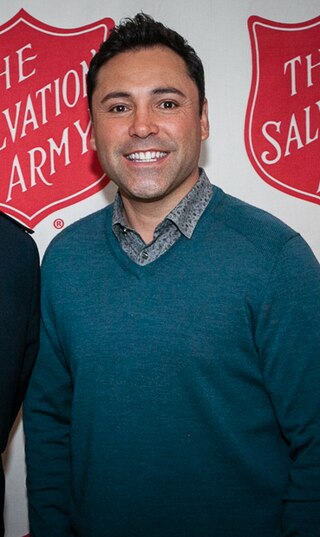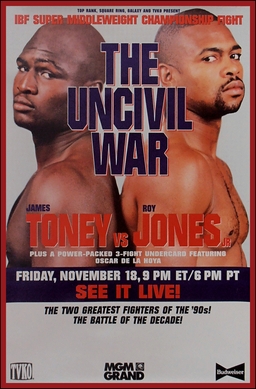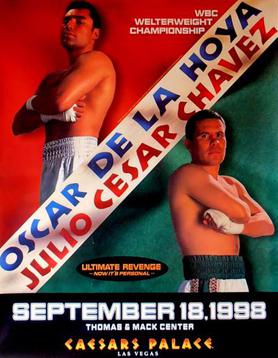
Julio César Chávez González, also known as Julio César Chávez Sr., is a Mexican former professional boxer who competed from 1980 to 2005. A multiple-time world champion in three weight divisions, Chávez was listed by The Ring magazine as the world's best boxer, pound for pound, from 1990 to 1993. During his career he held the WBC super featherweight title from 1984 to 1987, the WBA and WBC lightweight titles between 1987 and 1989, the WBC light welterweight title twice between 1989 and 1996, and the IBF light welterweight title from 1990 to 1991. He also held the Ring magazine and lineal lightweight titles from 1988 to 1989, and the lineal light welterweight title twice between 1990 and 1996. Chávez was named Fighter of the Year for 1987 and 1990 by the Boxing Writers Association of America and The Ring respectively.

Oscar De La Hoya is an American boxing promoter and former professional boxer who competed from 1992 to 2008. His accolades include winning 11 world titles in six weight classes, including lineal championships in three weight classes. De La Hoya was nicknamed "The Golden Boy of Boxing" by the media when he represented the United States at the 1992 Summer Olympics where, shortly after having graduated from James A. Garfield High School, he won a gold medal in the lightweight division, and reportedly "set a sport back on its feet."
Jorge Adolfo Páez is a Mexican actor, circus performer and former professional boxer. In boxing he held the WBO and IBF featherweight titles. Paez's nickname of "El Maromero" is in honor of the somersault acts he performs at the circus. It was in the circus that he learned acrobatic moves he would later use in the boxing ring. Páez is also the father of Azriel Páez, Jorge Páez Jr., and Airam Páez.
Pernell Whitaker Sr. was an American professional boxer who competed from 1984 to 2001, and subsequently worked as a boxing trainer. He was a four-weight world champion, having won titles at lightweight, light welterweight, welterweight, and light middleweight; the undisputed lightweight title; and the lineal lightweight and welterweight titles. In 1989, Whitaker was named Fighter of the Year by The Ring magazine and the Boxing Writers Association of America. He currently holds the longest unified lightweight championship reign in boxing history at six title defenses. Whitaker is generally regarded as one of the greatest defensive boxers of all-time.
Isufu "Ike" Quartey was a Ghanaian former professional boxer who competed from 1988 to 2006. He held the WBA welterweight title from 1994 to 1998, and challenged once for IBF junior-middleweight title in 2000.
As in the 1980s, the 1990s in boxing's popularity focused on all divisions. When 1980s legends Sugar Ray Leonard, Thomas Hearns, as well as others retired, newer superstars filled the void: Pernell Whitaker, Julio César Chávez, in the early 1990s, Oscar De La Hoya, Félix Trinidad, Roy Jones Jr. and Floyd Mayweather Jr. in the mid to late 1990s.

James Toney vs. Roy Jones Jr., billed as The Uncivil War, was a professional boxing match held on November 18, 1994, for the IBF super middleweight championship.

Oscar De La Hoya vs. Shane Mosley II, billed as Redemption, was a professional boxing match contested on September 13, 2003 for De La Hoya's WBA (Unified), WBC, IBA, and The Ring light middleweight championship.

Oscar De La Hoya vs. Shane Mosley, billed as Destiny, was a professional boxing match contested on June 17, 2000 for the WBC and IBA welterweight titles.

Oscar De La Hoya vs. Hector Camacho, billed as Opposites Attack, was a professional boxing match contested on September 13, 1997 for the WBC welterweight championship.

Oscar De La Hoya vs. Julio César Chávez II, billed as Ultimate Revenge, was a professional boxing match contested on September 18, 1998 for the WBC welterweight championship.
Wilfredo Rivera is a Puerto Rican former professional boxer who fought three times for world titles, losing to Pernell Whitaker twice and to Oscar De La Hoya.

Buddy McGirt vs. Pernell Whitaker, billed as Pound for Pound: Who's Number One?, was a professional boxing match contested on March 6, 1993, for the WBC welterweight title.

Pernell Whitaker vs. Julio César Chávez, billed as The Fight, was a professional boxing match contested on September 10, 1993, for the WBC welterweight title.

Pernell Whitaker vs. Buddy McGirt II, billed as The Final Say, was a professional boxing match contested on October 1, 1994, for Whitaker's WBC welterweight title.

Pernell Whitaker vs. Gary Jacobs, billed as "Summer's Blockbuster" was a professional boxing match contested on August 26, 1995 for the WBC and lineal welterweight titles.

Oscar De La Hoya vs. Ike Quartey, billed as The Challenge, was a professional boxing match contested on February 13, 1999, for the WBC welterweight title.

Félix Trinidad vs. Pernell Whitaker, billed as The Big Picture was a professional boxing match contested on February 20, 1999, for the IBF welterweight title.

Oscar De La Hoya vs. Miguel Ángel González, billed as For Pride and Country, was a professional boxing match contested on January 18, 1997 for the WBC super lightweight title.

Oscar De La Hoya vs. David Kamau, billed as Oscar Night at the Dome, was a professional boxing match contested on June 14, 1997 for the WBC welterweight title.















